AAALetter - June 2020
Volume 32, Number 1
Table of Contents
- Introduction to the Issue by Stephanie Link, AAALetter Editor
- Taking Stock During Turbulent Times by Kendall King, AAAL President
- Remaining Hopeful Amidst Uncertainty: AAAL 2021 by Patsy Duff, AAAL First Vice President & 2021 Conference Chair
- Diversity Update by Fabiola Ehlers-Zavala, AAAL Secretary and AAAL-AILA Representative
- Latest News from AILA by Fabiola Ehlers-Zavala, AAAL Secretary and AAAL-AILA Representative
- Moving Forward, Looking Back (Twenty Years On) by Thomas Ricento, Outgoing Chair of the Fund for the Future of Applied Linguistics (FFAL)
- 2020 Graduate Student Council: Progress and Engagement by Hoashan (Sally) Ren and Laxmi Prasad Ojha, Co-Chairs of the Graduate Student Council Steering Committee
- Collaborate, Mobilize, and Advocate for Social Justice by Netta Avineri, Chair of the Public Affairs and Engagement Committee
- Future Directions by Carolin Fuchs and Michael Amory, Chair and Vice-Chair of the Standing Committee for Online Education and Outreach
- Third Annual Conference Connections Goes Virtual by Bethany Gray, Chair of the Conference Connections Committee
- Robert B. Kaplan, A Remembrance by Bill Grabe, Northern Arizona University
- Tribute to Sarah J. Berke, Nardone Consulting Group by Laura Collins, Concordia University and Heidi Byrnes, Georgetown University
- Professional Tip: Managing Communication During a Crisis by Fabiola Ehlers-Zavala, AAAL Secretary and AAAL-AILA Representative
- How to Participate in the AAAL Resolutions Process by the AAAL Office
Introduction to the Issue
Letter from the Editor
Stephanie Link, Oklahoma State University
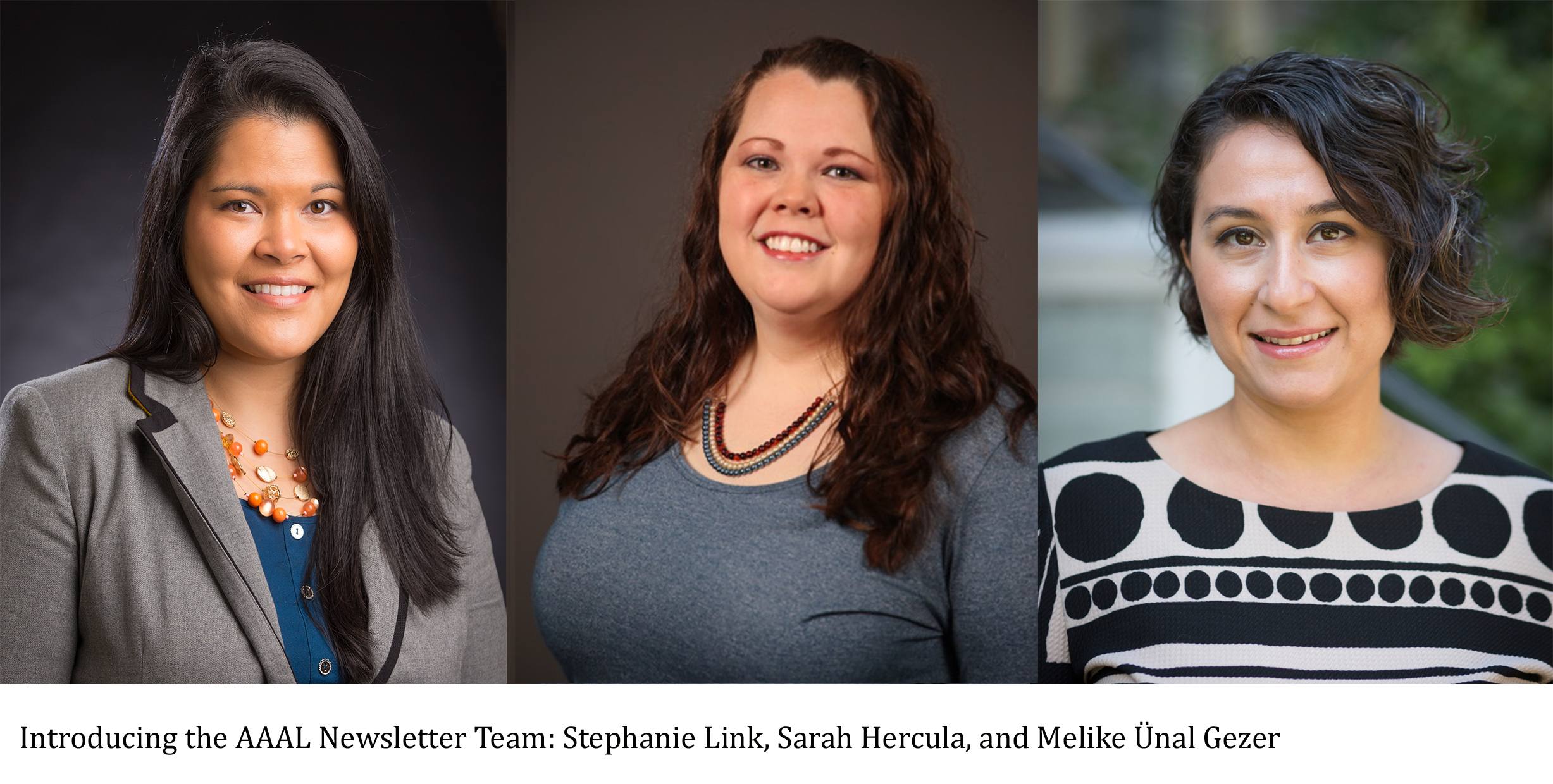 During times of uncertainty and unrest, community can bring together individuals to work towards a common good and a brighter future. AAAL is one such community that continues to shine light on the power that an appreciation for difference, equity, and inclusion brings to our global context. By growing and working together, we can expand access to knowledge and resources that enable our members and affiliates to learn about and improve our profession and our practice. The June 2020 issue of the AAALetter addresses the varied ways in which the AAAL community has collaborated and engaged to reach and support its members. You will read about several of these efforts in AAAL President Kendall King’s response to recent acts of racial violence and her goals for keeping our Association strong in the aftermath of the cancellation of our 2020 Denver conference.
During times of uncertainty and unrest, community can bring together individuals to work towards a common good and a brighter future. AAAL is one such community that continues to shine light on the power that an appreciation for difference, equity, and inclusion brings to our global context. By growing and working together, we can expand access to knowledge and resources that enable our members and affiliates to learn about and improve our profession and our practice. The June 2020 issue of the AAALetter addresses the varied ways in which the AAAL community has collaborated and engaged to reach and support its members. You will read about several of these efforts in AAAL President Kendall King’s response to recent acts of racial violence and her goals for keeping our Association strong in the aftermath of the cancellation of our 2020 Denver conference.
We welcome Patsy Duff in her first contribution to the AAALetter as First Vice President & Houston 2021 Conference Chair. Patsy provides a preview of the exciting AAAL 2021 program. Amidst global health concerns, Patsy and her team have been working at a distance to reunite us in 2021. We hope you submit an abstract by July 15, and we will see you at the conference!
As always, we are thankful for the continuous contributions of AAAL Secretary and AAAL-AILA representative, Fabiola Ehlers-Zavala. Fabiola begins with the timely topic of diversity, equity, inclusion, and access (DEIA). AAAL leadership is prioritizing critical conversations about DEIA, and Fabiola offers an overview of recent initiatives that have emerged out of feedback from our members. Your voice is important to the AAAL leadership, so please continue to share ideas about how we can advance DEIA initiatives at all levels of the Association. In keeping with our goals of inclusion and outreach, AAAL continues to embrace our affiliation with the International Association of Applied Linguistics (AILA). We were saddened by the postponement of the 2020 World Congress, and we hope you can participate in 2021 in Groningen. In Fabiola’s final piece, she provides an enlightened perspective towards managing communication during a crisis. You and your colleagues will find her tips especially useful if you are in leadership/administrative roles or are educators/researchers who may be struggling to navigate the unknown in your professional lives. Find these tips towards the end of the issue.
In times of adversity, leaders are often called upon to uplift others. Fortunate for us, strong leadership runs deep in the applied linguistics community. One of these leaders is Bill Grabe, former chair of the Fund for the Future of Applied Linguistics (FFAL) committee. Thomas Ricento, outgoing chair of the FFAL, provides a tribute piece to Bill, acknowledging his long-standing service and dedication to the future of our profession. Tom and Bill’s friendship of over 40 years highlights the strength of academic companionship in the AAAL community!
As graduate students, many of us form important professional relationships, and we are proud of the Graduate Student Council for fostering this development. This year’s steering committee co-chairs, Haoshan (Sally) Ren and Laxmi Prasad Ojha, review last year’s foci, provide a leadership update, and highlight exciting news and events, such as their upcoming AAALGrads Newsletter Summer Special Issue.
Social justice is at the heart of many current conversations within the EC and across committees, and Netta Avineri discusses how you can become involved in social change by offering services to the Public Affairs and Engagement Committee and by joining the applied linguistics and social justice listserv. She also recommends that members get involved by reading and supporting the AAAL Position Statements. Also initiating change is the Standing Committee for Online Education and Outreach chaired by Carolin Fuchs and Michael Amory (Vice Chair). The instability of this past spring opened our eyes to the plight of unequal access to resources. The Committee for Online Education and Outreach has begun to address this concern by strategizing methods of reaching more individuals through virtual platforms. Be sure to read their message and stay tuned for upcoming AAAL webinars this summer!
In the meantime, mentor-mentee pairs have been meeting regularly all across the globe to discuss professional topics ranging from defining a research trajectory to landing your first job. We give a big thank you to the Past Chair, Peter De Costa, and current Chair, Bethany Gray, of the Conference Connections Committee for their highly successful implementation of a mentoring network. In its third year, this committee paired more than 100 students with faculty mentors, and we cannot wait to see this committee grow!
I end my introduction to this month’s issue with deep gratitude to some individuals who have made and continue to make our Association prosper. I start with the late Robert B. Kaplan. Many of us never had the pleasure of meeting Dr. Kaplan, but his work provides a foundation for many applied linguists. We are grateful for Bill Grabe’s contribution in remembrance of Dr. Kaplan, reminding us that the knowledge we create today will not be forgotten.
Another individual who has made a lasting impact on the Association is Sarah J. Berke. Sarah provided years of commitment to the betterment of AAAL, and now her personal path is leading her in new directions. Laura Collins and Heidi Byrnes provide a tribute, but we should all be saying “thank you” for all that Sarah has done to evolve the Association.
Lastly, I am personally indebted to two individuals who have made this current issue possible. Sarah Hercula (Missouri University of Science and Technology) and Melike Ünal Gezer (TED University) are the newest members of the AAALetter editorial team. A profound thank you is in order to acknowledge their time and commitment to the AAAL community.
If you would like to get involved at any level of the Association, please reach out today by following us on Twitter and Facebook. You can also provide suggestions for the newsletter at AAALetter@aaal.org, and thanks for reading!
Taking Stock During Turbulent Times
Message from the AAAL President
Kendall King, University of Minnesota
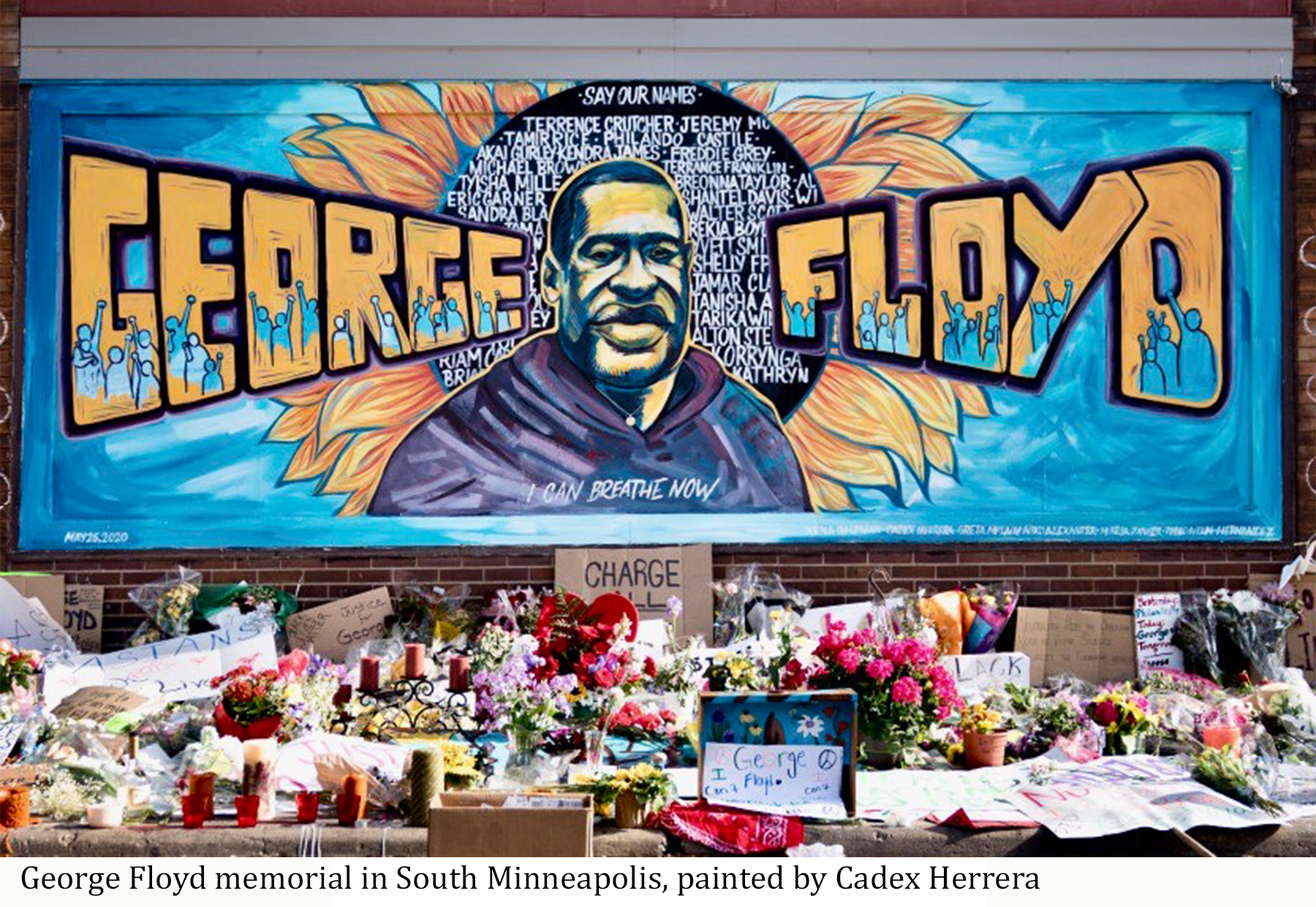 Greetings from Minneapolis, a city which has been reeling since the murder of George Floyd on May 25. Our hearts remain heavy with grief and anger. While institutionalized violence, systematic racism, and anti-blackness are deeply woven into U.S. society, the last two weeks have brought these long-standing inequalities in the U.S. and in other parts of the world into even sharper relief. For me, as I know for many others, these events have been cause for reflection and for renewed commitment to do and to support work that contributes to greater social justice, anti-racism, and equity. I’m proud to be part of an association that has actively affirmed its commitment to supporting racial diversity, to promoting inclusivity in our organization, and to endorsing anti-racist efforts more broadly. However, these efforts are insufficient; much more work needs to be done to combat racism and undo discrimination in all of its forms.
Greetings from Minneapolis, a city which has been reeling since the murder of George Floyd on May 25. Our hearts remain heavy with grief and anger. While institutionalized violence, systematic racism, and anti-blackness are deeply woven into U.S. society, the last two weeks have brought these long-standing inequalities in the U.S. and in other parts of the world into even sharper relief. For me, as I know for many others, these events have been cause for reflection and for renewed commitment to do and to support work that contributes to greater social justice, anti-racism, and equity. I’m proud to be part of an association that has actively affirmed its commitment to supporting racial diversity, to promoting inclusivity in our organization, and to endorsing anti-racist efforts more broadly. However, these efforts are insufficient; much more work needs to be done to combat racism and undo discrimination in all of its forms.
As we take stock of where we are in 2020 in light of the pandemic and its aftermath, and to chart the course ahead for our organization, these needs will be front and center in all of our leadership work. As AAAL President, over the coming months, I will be working towards three related goals: to keep our Association fiscally viable in order to ensure its sustainability and capacity to do this work; to encourage and incorporate more members—and in particular more junior scholars and scholars of color—into our Association’s leadership positions; and to continue to make progress on AAAL’s work to promote greater inclusion and equity within and beyond our organization. Below I highlight some of the work underway towards these ends.
Finance updates
In the wake of the 2020 conference cancellation, AAAL’s Executive Committee (EC) has been engaged in extensive budget analysis. The cancellation resulted in a significant financial loss for AAAL, as many venue-based expenses could not be recovered. We offered conference registration refunds to all participants who requested them (retaining 10% to cover credit card fees and associated administrative costs). We were able to do so because, for years, AAAL has diligently followed best financial practices and maintained an emergency reserve fund sufficient to cover one year of operational costs. That fund, however, is in the form of investments, and with the worldwide financial crisis, their value has diminished, meaning this is a suboptimal time to sell and to make withdrawals. However, to cover the 2020 conference costs, we must withdraw from these accounts.
These financial losses will have repercussions going forward, as we will need to replenish those reserves while maintaining operations. And of course, this is all unfolding at a time when our current and potentially new members are likely experiencing their own personal or institutional financial constraints. To recover and to move productively forward, AAAL is going to need to become a fiscally leaner organization; I highlight some of these ongoing efforts here.
Recent initiatives
AAAL, like many other organizations, is actively evaluating operations in light of our core mission. I want to assure members that while this presents challenges, there are also opportunities for new connections. For example, while we were all disappointed not to meet face-to-face in Denver, AAAL members and leadership are innovatively using and exploring technology as we continue to connect and to work in new ways:
- Through our Conference Connections initiative, mentor-mentee pairs have been meeting up virtually to talk about their research and scholarly careers. Many pairs have already met online and reported many highly productive exchanges.
- The 2020 Graduate Student Travel Awardees have been invited to record abridged versions of their research presentations to be promoted and published in mid-June on our AAAL website.
- Many of our 2020 awards will be presented virtually in the coming weeks; these sessions will be recorded and posted on our AAAL site. Our first talk, by DSSA award winner Ryuko Kubota, will be on “Engagement in Praxis in Critical Applied Linguistics.”
- Our Online Education and Outreach Committee has organized a special summer session with journal editors on publishing.
- AAAL’s Public Affairs and Engagement Committee (PAEC) will be hosting a special webinar in the coming weeks on race and engagement in the field of applied linguistics.
- AAAL’s Executive Committee members and staff introduced themselves and provided brief updates on AAAL work via personally recorded videos, compiled and shared via social media.
- This year’s Annual Review of Applied Linguistics will soon be published and is available as a member benefit. The theme, "ARAL at 40: Looking Back and Moving Ahead," showcases articles that highlight foundations, recent developments, and new directions for the field. In light of recent events, members might be especially interested in the multiple articles in this issue that critically engage with issues of antiracism, decolonization, and the implications for applied linguistics.
- Publishers, who have long supported the AAAL conference, are eager to connect with the membership and are offering special discounts to us. Information was sent to members in May and showcased on our website and on social media.
Changes in governance and administration
With respect to longer-term initiatives, I’m pleased to announce that the vote on the proposed changes to the bylaws concerning EC roles passed with a very high level of agreement (ranging from 94–98% across the varied proposed changes). These changes will re-structure the roles of the EC so that the First Vice President (VP) serves one year as President-Elect prior to serving as President. This new President-Elect term creates a transition planning year between serving as Conference Chair and assuming the President role. The immediate Past President will remain a highly valued colleague in the EC. In this role, the Past President will remain an honorary, ex-officio, non-voting EC member, included in all EC meetings but not required to attend. (The total service term remains four years.) This change also formalizes a practice that has evolved in recent years whereby the Second VP is mentored into the Conference Chair role.
These new bylaws will be fully put into effect with the work of the 2020–2021 Nominating Committee; the first person nominated under this new system will be presented to the membership in March 2021, will be voted on in May–June 2021, and will take office in March 2022. The transition will result in one year (2022–2023) in which the Presidency is open (given that the Conference Chair will not move immediately into the President role).
I am pleased to announce that the EC unanimously approved the appointment of Dr. Fabiola Ehlers-Zavala, current AAAL Secretary, to this role, and she graciously accepted. Fabiola is deeply knowledgeable about AAAL operations and is already a thoughtful leader and an elected and highly valued member of the EC. Among other duties, she has also been championing AAAL’s varied diversity initiatives. I’m thankful to Fabiola for accepting this role and to Laura Collins (Past President) for doing the heavy-lifting to re-conceptualize this change and improvement to our governance structure.
I’m also very pleased to introduce you to Terry Dougherty, from AAAL’s business office (Nardone Consulting Group or NCG), who has recently taken over the role of Managing Director for AAAL. Terry has many years of experience in association management and has worked full time for several years with NCG (AAAL’s management agency since 2010). The EC is impressed with her professionalism and her expertise in budgeting. I’d also like to take this opportunity to express my gratitude and appreciation for the decade-plus work that Sarah Berke, Terry’s predecessor, has done for AAAL. Her dedication, intellect, and attention to detail have done much to put AAAL in the strong shape it is in. We wish her all the best as she spends more time with her growing family. (Please see the “Tribute to Sarah J. Berke” in this issue.)
Lastly, in October, the EC will be revisiting our current by-laws, which prohibit us from quickly responding as an organization to important political events with public statements. At present, any position statement requires a full member vote.
Member engagement
As we move ahead in times that can be characterized, at best, as unsettled, I want to stress that AAAL continues to advocate for and serve our members. Simultaneously, AAAL likewise needs its members. What can you, as members, do to help?
Volunteer. In addition to the hundreds of volunteers that are needed to organize and run the annual conference, the operations of AAAL throughout the year depend on over 100 leadership positions on permanent committees, councils, temporary ad-hoc committees, and task forces. Please respond to requests for your expertise when calls go out.
Join/renew. If you are able, renew your membership, even if you are unsure whether you will attend the 2021 conference. As noted earlier, we are also aiming to provide more membership benefits to you between conferences, including live content (short presentations, synopsis of talks, etc.) and posted on our website.
Participate. Over the next few months, we’ll have more video content (e.g., awards and talks) on our AAAL webpage and our Facebook page. Please participate by watching, commenting, and sharing on your own social media.
Submit. Plan on participating in AAAL 2021! We, and your colleagues around the world, miss you. Please submit an abstract and plan on connecting with your colleagues in March.
Lastly, a final thanks to the many members of our association—too many to name here—who gave thousands of hours of work on dozens of committees over the last year. Your work to support, mentor, and recognize your colleagues is crucial to the Association, much appreciated, and will help to move all of us forward. Your work matters; your words matter.
Remaining Hopeful Amidst Uncertainty: AAAL 2021
Message from the AAAL First Vice President & Houston 2021 Conference Chair
Patsy Duff, University of British Columbia
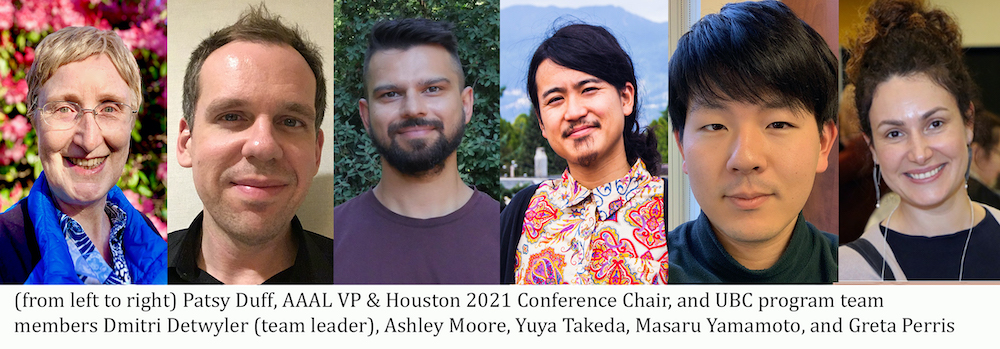
Greetings, everyone! I’m writing this piece amidst continuing COVID-19 curtailments of many aspects of our collective lives and the tremendous worldwide calls to action and public peaceful protest in response to persistent and pernicious forms of racism, authoritarianism, and violence. The global pandemic and the racially motivated killing of citizens remind us of some of the freedoms and privileges—of movement, travel, association, healthcare, justice, etc.—many of us take for granted. These events also expose the precariousness of some AAAL members’ employment status and opportunities, as well as the vulnerabilities of educational programs and lives that rely heavily on face-to-face contact and transnational travel for study-abroad, research, and work. The current COVID-19 situation also alerts us to the plight of those whose lives have been much more deeply and systemically affected by this pandemic and by other (often related) social, economic, political, and educational forces of marginalization and oppression. The combination of the two crises, plus many others involving global health and economic disparities and climate change, should be deeply concerning for all individuals and societies. Applied linguists’ reflections, research, and actions vis-à-vis these critical themes will certainly be featured in upcoming conference programs, publications, and messages.
AAAL 2021 conference
Fortunately, this is also the season when spring turns to summer for those of us in the Northern Hemisphere. The longer, brighter days, beautiful blossoms, new leaves, warm breezes, and lovely outdoor spaces remind us to find calm and take pleasure in our local surroundings despite the many uncertainties, cancellations, and disappointments we have experienced. It is also a time for planning for the upcoming academic year and conferences.
As AAAL Vice President and Conference Chair of our Houston 2021 Conference, I’m excited to tell you about our plans, which have been well underway for over a year already! The AAAL 2021 Program Team at the University of British Columbia is working hard to ensure that we have a fabulous program. Our program team members include Dmitri Detwyler (team leader, and liaison to invited speakers and event organizers), Ashley Moore (strand coordinator liaison), Yuya Takeda and Masaru Yamamoto (Confex trouble-shooters), and Greta Perris (program planner, together with the team). All are, or will soon be, PhD students at UBC in Language & Literacy Education and are helping me put together a strong program.
Our AAAL 2021 Program is already taking shape, with:
- Five outstanding, dynamic plenary speakers (from the UK, Australia, and US), and two featured speakers (one each from Canada and the US);
- More than a dozen thought-provoking invited colloquia;
- Workshops on narrative research methods in applied linguistics and multimodal data transcription and analysis; and
- Various other formal and informal events, such as Conference Connections meetings of mentors and mentees, receptions, and Graduate Student Council activities.
The invited speakers will address important issues representing the breadth of applied linguistics across a variety of geographical regions and linguistic contexts.
For the peer-reviewed portion of the program, we have 22 dedicated strand coordinators prepared to launch the reviewing of conference proposals (papers, colloquia, roundtables, posters) after the submission deadline of July 15th. I am very grateful to these coordinators and hundreds of volunteer reviewers--including nearly 150 new volunteers who responded to our open call for reviewers this spring--for their crucial contributions to our profession and program. I also wish to thank numerous other AAAL members who have graciously accepted my invitations to chair or serve on our Standing Committees, including many awards committees, whose adjudication work is now underway.
Denver 2020 -> Houston 2021
Cancelling the Denver conference was terribly disappointing for all of us but we have tried to publicize some of the excellent content Kendall King and her team planned for AAAL 2020 by:
- Recognizing our 2020 award-winners through virtual events this summer, beginning in June;
- Inviting 2020 plenary speakers and invited colloquium organizers to present their work at AAAL 2021;
- Rescheduling the very popular AAAL 2020 conference workshop on multimodal data transcription and analysis (now in the 2021 program).
Unfortunately, carrying forward the entire program simply wasn’t feasible due to the constraints of the conference management system we use (Confex) and the need to be able to include new, updated, or revised content and presenters. The call for proposals is now open to submissions (June 1–July 15). Proposals originally submitted for presentation in Denver can be resubmitted for new consideration in the 2021 review process. This year, I encourage colloquium organizers to consider the 1-hr colloquium option (which now can accommodate three short talks plus one discussant), in addition to the traditional 2-hr colloquium format. This will allow us to accommodate a larger number of colloquia. Please note that the Confex system this year blocks multiple submissions by the same individuals. Our AAAL conference submission policy remains the same as ever: people can submit and appear on the program first author on one paper/roundtable/poster; and can take on one additional role as colloquium organizer or discussant. (It is not possible to be a discussant on more than one colloquium, nor an organizer or co-organizer of more than one colloquium.) It is possible to appear as second author more than once, however. The difference this year is we do not have to manually track multiple submissions; Confex will disallow submissions that violate these rules.
Community engagements: Finding an academic “home” in AAAL
I have been a proud and active member of AAAL since 1991, when I was still a graduate student at UCLA, and attended my first conference in New York that year. I have also been a member of various other associations over the years, but AAAL holds a very special place in my heart and sense of community. I hope that you, too, feel that this is your community, that what we are doing is worthwhile, that we are fulfilling our commitment to being more diverse and inclusive and equitable, and that we are responding responsibly and proactively to pressing real-world linguistic and sociopolitical issues that affect individuals and society. Please get involved in AAAL–volunteer, contribute, and participate!
Final remarks
In closing, I wish all of you in the Northern Hemisphere a wonderful summer and for those in the South a pleasant winter. Be safe, keep well, and stay connected!
Diversity Update
Message from the AAAL Secretary and AAAL-AILA Representative
Fabiola Ehlers-Zavala, INTO Colorado State University
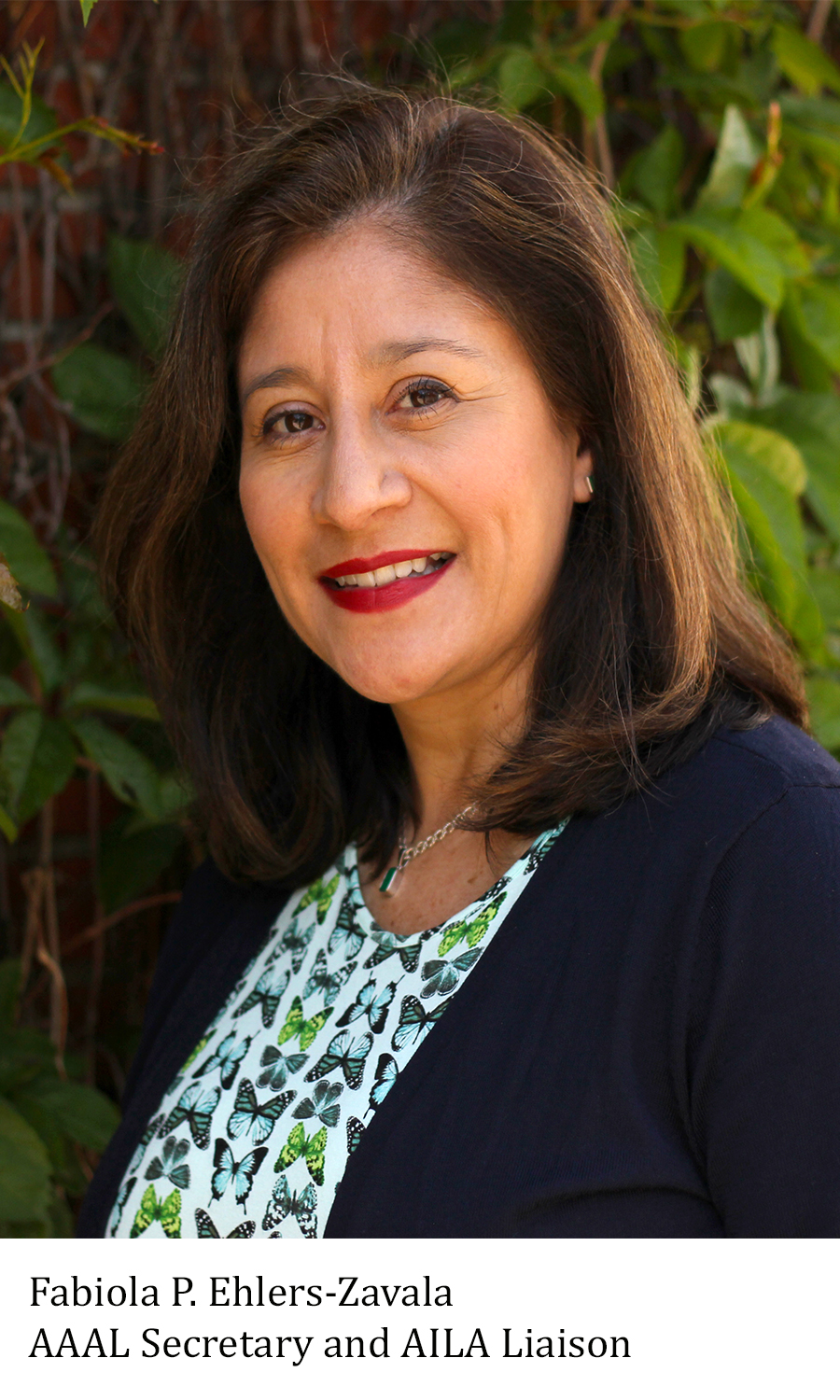 Our world continues to evolve very quickly, and all of us are trying to process what we encounter each day, both good and bad. Therefore, I have felt the need to add this introductory segment to my initial contribution to the AAALetter to acknowledge the most recent tragic events that unfortunately we have all come to painfully witness in the killing of George Floyd. As we very regretfully know, his death adds to the countless other tragic deaths, and it only elevates our imperative to continue to seek ways to advance our diversity, equity, inclusion and access (DEIA) cause. AAAL is fully committed to do what is in our power to contribute to a more socially just world. Again, as I have noted before in my remarks to the membership, this is a challenging journey, but together we can work to meet it as it is our collaborative imperative because of the values that we hold dear and that bring us together as applied linguists. I hope that all of you had an opportunity to read the statement from our President, Kendall King, on behalf of the EC in response to the murder of George Floyd. Furthermore, we have also endorsed the TESOL and ACTFL statements condemning the Killing of George Floyd and Systemic Racism / Racial Injustice in the US, as well as the House Resolution 908 “Condemning all forms of anti-Asian sentiment as related to COVID-19” as a most immediate measure while we address our internal processes and procedures to more quickly respond with our own statements.
Our world continues to evolve very quickly, and all of us are trying to process what we encounter each day, both good and bad. Therefore, I have felt the need to add this introductory segment to my initial contribution to the AAALetter to acknowledge the most recent tragic events that unfortunately we have all come to painfully witness in the killing of George Floyd. As we very regretfully know, his death adds to the countless other tragic deaths, and it only elevates our imperative to continue to seek ways to advance our diversity, equity, inclusion and access (DEIA) cause. AAAL is fully committed to do what is in our power to contribute to a more socially just world. Again, as I have noted before in my remarks to the membership, this is a challenging journey, but together we can work to meet it as it is our collaborative imperative because of the values that we hold dear and that bring us together as applied linguists. I hope that all of you had an opportunity to read the statement from our President, Kendall King, on behalf of the EC in response to the murder of George Floyd. Furthermore, we have also endorsed the TESOL and ACTFL statements condemning the Killing of George Floyd and Systemic Racism / Racial Injustice in the US, as well as the House Resolution 908 “Condemning all forms of anti-Asian sentiment as related to COVID-19” as a most immediate measure while we address our internal processes and procedures to more quickly respond with our own statements.
What follows next then is the statement I had initially prepared to ensure all members were brought into the loop of our continuous work, including what I addressed during my report at our virtual General Business Meeting this past March.
As you know all too well, due to the unprecedented changes we have faced given COVID-19, the AAAL Executive Committee (EC) had to make some very difficult decisions regarding what had been planned around conference time. Typically, the EC meets right before the conference, but this year, it happened virtually and in a more compressed way. That meant making changes to our agenda as we were preparing to change the format of our EC meeting from face-to-face to virtual. As I reported at the General Business Meeting, the EC dedicated a segment of the agenda to discussion regarding Diversity, Equity, Inclusion, and Access (DEIA). During our meeting, I presented the EC with a number of questions to reflect upon and to continue considering as we move forward (e.g., membership engagement in DEIA discussions, language on our website that ensures DEIA is front-and-center, a strategic plan that addresses DEIA concerns, and survey results).
Regretfully, we also had to modify our initial plan for the General Business Meeting, given that we weren’t able to meet in person in Denver. We had hoped to dedicate a significant amount of time during that meeting to come together in small groups to discuss DEIA-related ideas the membership would like for the EC to consider. Nevertheless, despite meeting changes and conference cancellations, as I reported at our Virtual General Business Meeting, we have received the results from our biannual survey. That survey contains a specific segment dedicated to diversity. I am attaching the results of the survey I covered during the virtual meeting so that you can see for yourselves what feedback we received. Keep in mind, though, that the 2020 response rate was considerably lower (157 respondents or 8.9% of the membership) in comparison to the previous survey conducted in 2018 (305 respondents or 14% of the membership). Perhaps you will agree with me that one major takeaway is the need for AAAL to continue its work in trying to eradicate barriers and address structural concerns that the membership perceives as key to enhancing diversity, equity, and inclusion. Furthermore, we have to figure out ways to ensure that our membership has the information they need to offer informed feedback.
When it comes to the various initiatives related to DEIA, one item that has caught my attention—and that suggests the need to improve the communication about our work—is that colleagues will often ask what diversity initiatives we have tackled as an organization. For those of us in the EC, this seems a fairly evident question, as we are very close to the conversation and are actively engaged in these initiatives. But I realize that it is probably better to over-communicate rather than under-communicate, especially as we onboard new members to AAAL. So, here are some examples of some of the more recent initiatives:
- Formation of a taskforce to identify initiatives to address/pursue;
- Assignment of the discussion of DEIA efforts in EC meetings to the Secretary (including the contribution of updates on diversity and inclusion efforts in the AAALetter to keep the membership appraised of progress);
- Establishment of social/mentoring network for diverse scholars (Sobremesa);
- Implementation of graduated fee structures for members from low-income economies;
- Establishment of family-friendly policies to support members attending the annual conference with their children; and
- Establishment of Conference Connections as a Standing Committee to provide mentorship to new/junior scholars attending the annual conference.
As I share these examples, I ask that you also help us spread the word. As we invite others to join AAAL, let’s ensure that we clearly communicate our mission and our priorities, as is the case with DEIA. On our end, the EC will continue to work to convey these messages more effectively and to ensure that we exercise inclusive leadership at all levels of the organization to advance our goals and priorities related to DEIA.
Latest News from AILA
Message from the AAAL Secretary and AAAL-AILA (International Association of Applied Linguistics) Representative
Fabiola P. Ehlers-Zavala, INTO Colorado State University
As you may know by now, the 2020 World Congress has been postponed by a year and has been rescheduled for August 15–21, 2021 in Groningen. Please visit the AILA website for the latest new developments.
Remember that to receive monthly updates from AILA in your inbox, which include information on conferences, please subscribe to their newsletter. Or you may go to our AAAL webpage and click on the AILA logo at the bottom of the page.
Moving Forward, Looking Back (Twenty Years On)
Message from Outgoing Chair of the Fund for the Future of Applied Linguistics (FFAL)
Thomas Ricento, University of Calgary
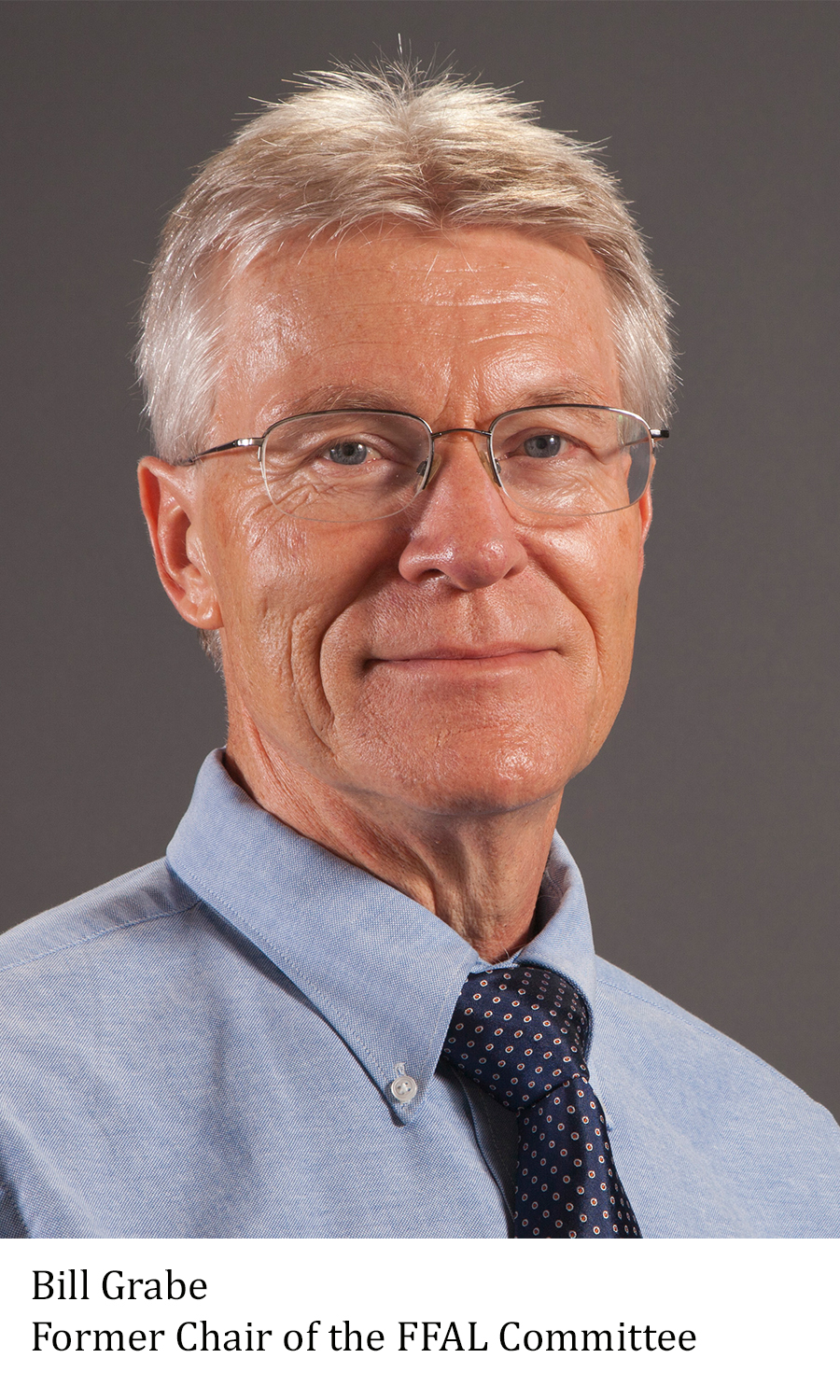 Twenty years ago, Bill Grabe was the driving force that led to the establishment of the Fund for the Future of Applied Linguistics (FFAL); the goal then, as now, was to secure the future of our profession by investing in current and future generations of academics through graduate student travel awards for the annual AAAL conference. During the initial fundraising campaign, organized and led by Bill between March 2000 and March 2001, AAAL received $30,364.76 in donations from AAAL members, along with contributions from academic institutions and publishers. As of April 2020, AAAL had received a total of $124,173.34 in voluntary contributions for the FFAL; this impressive growth over two decades was made possible because of a sustained effort to reach out to the AAAL membership and institutions through a letter-writing campaign, along with the support of AAAL leadership during that period. Because the FFAL is an endowment in which funds are invested, and only the dividends and income from those investments are used to fund graduate travel awards every year, the current value of the endowment has grown to about $166,000. Bill’s leadership role in FFAL has continued to be crucial; FFAL launched a new fundraising campaign in 2020 (with the goal of increasing the FFAL endowment to $210,000 by the end of 2021), and as a Past-Chair of the FFAL Committee during the 2019–2020 period, Bill shared his knowledge, expertise, and experience as a fundraiser to help plan the current campaign. I served as Chair of the FFAL Committee during this period, and I’m sure that I speak for the other members of the Committee in acknowledging that Bill’s role in developing a campaign strategy, based on his two decades of leadership with FFAL, was crucial in all aspects of the effort. I should also note the great support that we received from Sarah Berke, Managing Director of AAAL, who provided important archival information and data from past fundraising campaigns and also facilitated the distribution of letters and other forms of communication with the AAAL membership. Sustained leadership, usually done out of the limelight, is not often recognized or rewarded in professional organizations such as AAAL. I think it is important that, on behalf of the FFAL and the wider AAAL family, we publicly and enthusiastically thank Bill Grabe for his decades of service and commitment to ensuring that the future of our profession will be a bright one. As outgoing Chair of the FFAL Committee, I want to extend my personal thanks to Bill for his unwavering support of AAAL over many decades. I have known Bill since our graduate student days at the University of Southern California in the early 1980s, and we have maintained a friendship over the intervening years. Bill’s support for and commitment to the applied linguistics profession has been consistent and genuine over those many decades. I know that I speak for the entire AAAL family and the broader academic community when I say, “Well done, Bill!”
Twenty years ago, Bill Grabe was the driving force that led to the establishment of the Fund for the Future of Applied Linguistics (FFAL); the goal then, as now, was to secure the future of our profession by investing in current and future generations of academics through graduate student travel awards for the annual AAAL conference. During the initial fundraising campaign, organized and led by Bill between March 2000 and March 2001, AAAL received $30,364.76 in donations from AAAL members, along with contributions from academic institutions and publishers. As of April 2020, AAAL had received a total of $124,173.34 in voluntary contributions for the FFAL; this impressive growth over two decades was made possible because of a sustained effort to reach out to the AAAL membership and institutions through a letter-writing campaign, along with the support of AAAL leadership during that period. Because the FFAL is an endowment in which funds are invested, and only the dividends and income from those investments are used to fund graduate travel awards every year, the current value of the endowment has grown to about $166,000. Bill’s leadership role in FFAL has continued to be crucial; FFAL launched a new fundraising campaign in 2020 (with the goal of increasing the FFAL endowment to $210,000 by the end of 2021), and as a Past-Chair of the FFAL Committee during the 2019–2020 period, Bill shared his knowledge, expertise, and experience as a fundraiser to help plan the current campaign. I served as Chair of the FFAL Committee during this period, and I’m sure that I speak for the other members of the Committee in acknowledging that Bill’s role in developing a campaign strategy, based on his two decades of leadership with FFAL, was crucial in all aspects of the effort. I should also note the great support that we received from Sarah Berke, Managing Director of AAAL, who provided important archival information and data from past fundraising campaigns and also facilitated the distribution of letters and other forms of communication with the AAAL membership. Sustained leadership, usually done out of the limelight, is not often recognized or rewarded in professional organizations such as AAAL. I think it is important that, on behalf of the FFAL and the wider AAAL family, we publicly and enthusiastically thank Bill Grabe for his decades of service and commitment to ensuring that the future of our profession will be a bright one. As outgoing Chair of the FFAL Committee, I want to extend my personal thanks to Bill for his unwavering support of AAAL over many decades. I have known Bill since our graduate student days at the University of Southern California in the early 1980s, and we have maintained a friendship over the intervening years. Bill’s support for and commitment to the applied linguistics profession has been consistent and genuine over those many decades. I know that I speak for the entire AAAL family and the broader academic community when I say, “Well done, Bill!”
2020 Graduate Student Council: Progress and Engagement
Message from the GSC Steering Committee Co-chairs
Haoshan (Sally) Ren, Georgia State University
Laxmi Prasad Ojha, Minnesota State University
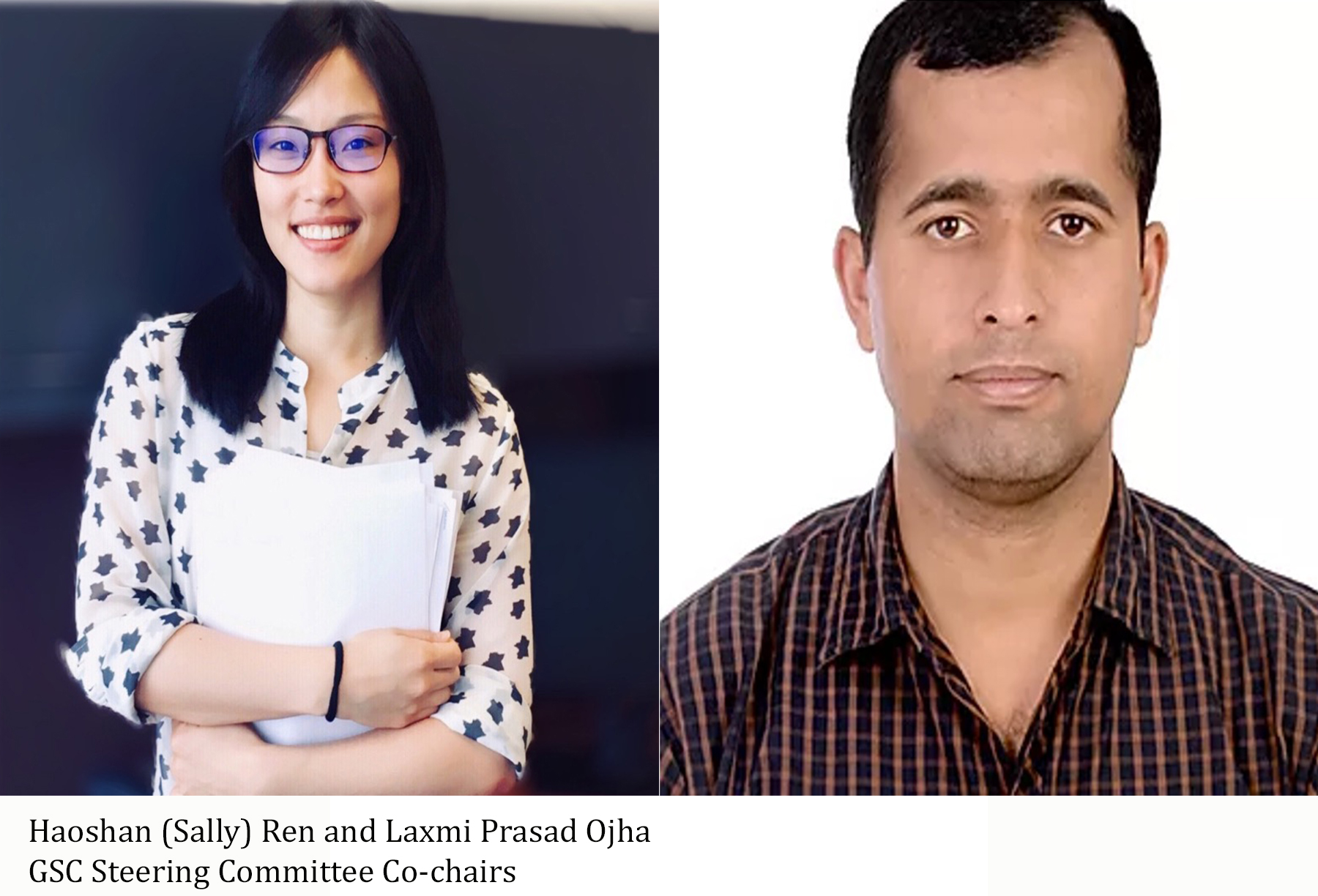 GSC in 2019 – Growth, involvement, creativity
GSC in 2019 – Growth, involvement, creativity
Led by Co-Chairs James Coda and Nichole Deschene, the 2019 Graduate Student Council (GSC) Steering Committee and its subcommittees carried out various initiatives and tasks to serve the AAAL graduate student members. Although the conference cancellation due to COVID-19 has prevented us from meeting in person for the graduate student events, we are grateful for the participation from the AAAL graduate students in online events and activities throughout the year.
In 2019, we hosted four webinars, posted monthly blogs and YouTube videos, and published two issues of our newsletter, AAALGrads, focusing on various topics of graduate students’ professional interests and lives. You can find the recordings of the webinars, the AAALGrads newsletters, and our blogposts on our GSC website.
Also, in preparation for the 2020 conference in Denver, the GSC Steering Committee organized four graduate student events (to be held at the conference) and a wine-naming competition in February. Although we missed the opportunity to socialize in person during the conference, we would like to acknowledge the winners of the wine-naming campaign.
We received 30 linguistics-themed names and a total of 89 votes for the three types of wines and non-alcoholic drinks. We’re happy to announce that the name “Schwadonnay” (for Chardonnay) proposed by Jamile Forcelini (Stetson University) received the highest vote (65.2%) and became the 2020 winner of the linguistics-themed wine. In addition, among the 10 names proposed for non-acholic drinks, “Non-AAALcoholic beverages,” proposed by Lauren Harvey (University of Arizona), received the highest vote (50.6%). We would like to congratulate the winners and express our appreciation to all the grad students who participated in this event.
We also launched a GSC Teespring Store where one can purchase products printed with designs from the AAAL GSC design winners in the past years. We would also like to congratulate the two winners of the 2020 AAAL GSC design competition: Rurik Tywoniw (Georgia State University) and Tianfang Wang (Pennsylvania State University). We will continue our annual design competition and look forward to seeing your creative artwork!
2020 Steering Committee & AAALGrads newsletter summer special issue
The transition of the AAAL GSC Steering Committee was completed in March 2020. The new Steering Committee is led by Co-Chairs Haoshan Ren (Georgia State University) and Laxmi Prasad Ojha (Minnesota State University), Social Media Member-at-Large Svetlana Koltovskaia (Oklahoma State University), Newsletter Member-at-Large Stefan Markus Vogel (University of Arizona), and Secretary Josiah Murphy (University of Hawai’i at Manoa). The 2020–2021 team will continue to strive for promoting the professional growth of the AAAL graduate students. Even as we remain socially distant, members of the GSC Steering Committee and the subcommittees are dedicated to maintaining and strengthening the connections among the AAAL graduate student community.
In response to the COVID-19 pandemic, members of the new Steering Committee quickly devoted themselves to the publication of a summer special issue of the AAALGrads newsletter, featuring topics related to the AAAL 2021 conference, selected resources for research and teaching, and discussions about the influence of COVID-19 on grad student life during and after the crisis. We will also include insights from the AAAL leadership and graduate students as well as faculty and administrators in higher education. We hope this issue provides support and advice for our graduate students during these difficult times.
We aim to provide content to best serve the AAAL graduate student community and highly appreciate and value your input. If you have any suggestions or questions about our future initiatives, please contact us at grad@aaal.org. You can also find the profiles of the Steering Committee members on our website and contact us individually.
If you want to learn more about GSC events and/or become a part of the Steering Committee, please follow our social media to keep updated about our events and calls:
GSC Website: www.aaal-gsc.org
Facebook: AAAL Graduate Students
Twitter: @AAALGrads
YouTube: AAAL GSC
LinkedIn: AAAL Graduate Student
Collaborate, Mobilize, and Advocate for Social Justice
Message from the Public Affairs & Engagement Committee (PAEC) Committee Chair
Netta Avineri, Middlebury Institute of International Studies
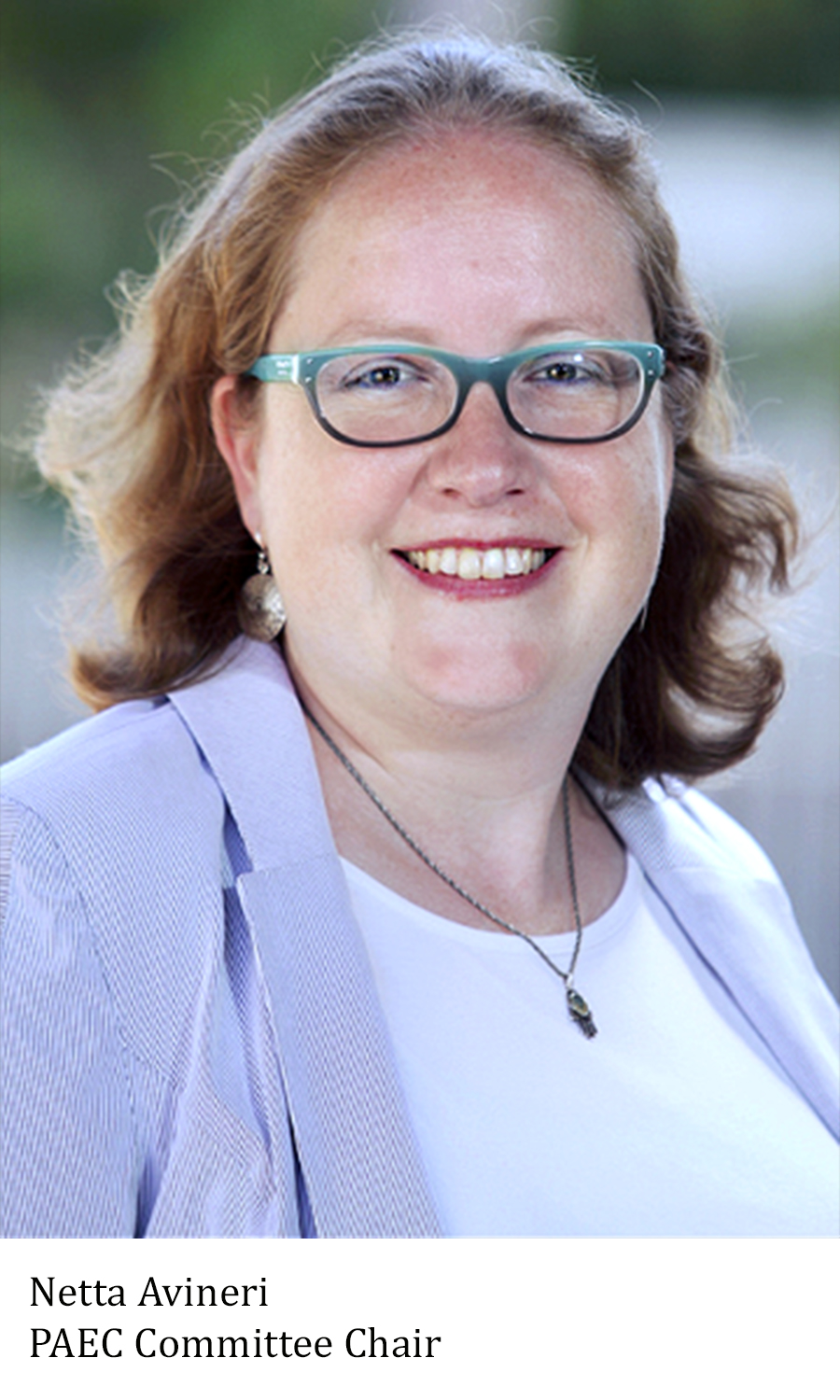 Now more than ever, we need to collaborate with one another to ensure justice for all. Have you been looking for a meaningful professional outlet for responding to current world events? Are you interested in collaborating with other applied linguists to advocate and mobilize for social change? Then we encourage you to get involved in the work of the AAAL Public Affairs and Engagement Committee.
Now more than ever, we need to collaborate with one another to ensure justice for all. Have you been looking for a meaningful professional outlet for responding to current world events? Are you interested in collaborating with other applied linguists to advocate and mobilize for social change? Then we encourage you to get involved in the work of the AAAL Public Affairs and Engagement Committee.
The Public Affairs and Engagement Committee (PAEC) is made up of six scholars/ practitioners with expertise in a range of applied linguistics topics relevant to social change: Netta Avineri, Laura Collins, Joel Gomez, Meg Malone, Rachel Showstack, and Bedrettin Yazan.
The committee is an AAAL standing committee that was formed in December 2016 as “an important means by which AAAL members can bring their collective expertise to bear on issues of social importance and inform public debate by speaking to issues of social and professional relevance” (AAAL Standing Rules - Standing Rule 3). The PAEC exists to meet the following goals:
- To represent the AAAL membership in relation to public issues and
- To facilitate AAAL members’ involvement in issues of public importance.
In line with these goals, please see our recent endorsement of House Resolution 908 “condemning all forms of anti-Asian sentiment as related to COVID-19.”
Since 2017, the PAEC has focused on creating position statements, endorsing professional organization and Congressional statements, participating in advocacy and social justice events at AAAL 2018 (AAAL Professional Development Session “Public Advocacy and Media Engagement: Voices from the Field”) and at TESOL 2018 (Colleague Association Session “AAAL Public Affairs and Engagement Initiative: Collaborating for Social Justice”), and building membership in the applied linguistics and social justice listserv.
The PAEC has also worked on a pilot project to create applied linguistics briefs (concise summaries of applied linguistics topics designed for a broad audience), the first three of which you can read in the December 2019 issue of the AAALetter. We are currently working on refining the guidelines for briefs and will publicize those guidelines for AAAL members in 2020.
AAAL members can get in touch with the PAEC with ideas for projects and initiatives of social concern. For example, members could propose position statements or endorsements or work with other scholars/practitioners to create op-ed pieces, blog posts, social media outreach, or webinars relevant to the membership and the public at large. Please feel free to contact Netta Avineri (paec@aaal.org) with your ideas.
We encourage AAAL members to join the applied linguistics and social justice listserv (over 200 members strong), an online collaborative space for sharing ideas, resources, publications, and initiatives focused on applied linguistics and social justice.
We also encourage you to submit a book proposal to the new De Gruyter Critical Approaches in Applied Linguistics book series (contact Netta Avineri, Series Editor, at navineri@gmail.com for more information).
Looking forward to working with you!
Future Directions
Message from the Standing Committee for Online Education and Outreach Chair and Vice-Chair
Carolin Fuchs, Northeastern University
Michael Amory, Oklahoma State University
The Standing Committee for Online Education and Outreach provides opportunities for learning and membership engagement that are not tied to an in-person context or conference. Our committee is charged with ensuring that AAAL is digitally accessible, providing opportunities for online education and connection, and engaging in outreach to the general public and to AAAL members and nonmembers. In order to develop and advance our initiatives and to facilitate the accomplishment of the committee’s overall goals, we recently formed several sub-committees. We sought candidates who represent diverse perspectives among current and new members of AAAL to serve on one of the newly formed sub-committees, which include the following:
- AAAL website content development,
- AAAL professional development,
- AAAL social media, and
- AAALetter.
The application and interview process was completed in early April, and we are pleased to introduce the various sub-committees and their members in this article.
AAAL website and content development
Sub-Committee Chairs: Michael Amory (Oklahoma State University), Joe Cunningham (Georgetown University), and Carolin Fuchs (Northeastern University)
It is our pleasure to introduce the new members of this sub-committee: Farah Akbar (Teachers College, Columbia University), Curtis Green-Eneix (Michigan State University), Marda Rose (The Bishop's School, San Diego, CA), and Amber Warren (University of Nevada, Reno). The sub-committee held its first official meeting at the end of April 2020, and we are currently brainstorming ideas and content to be generated. Our immediate goal is to conduct an AAAL member survey to determine the needs of the AAAL community. In addition, we plan to reach out to other AAAL committee chairs to discuss content for distribution, to build connections, and to identify areas of overlap and cooperation. Through this needs analysis, we will begin to develop and curate content and materials (e.g., a repository of online and educational resources) that can be accessed by all AAAL members. As a long-term goal, we will be exploring virtual conference participation options for AAAL members who cannot attend the annual conference.
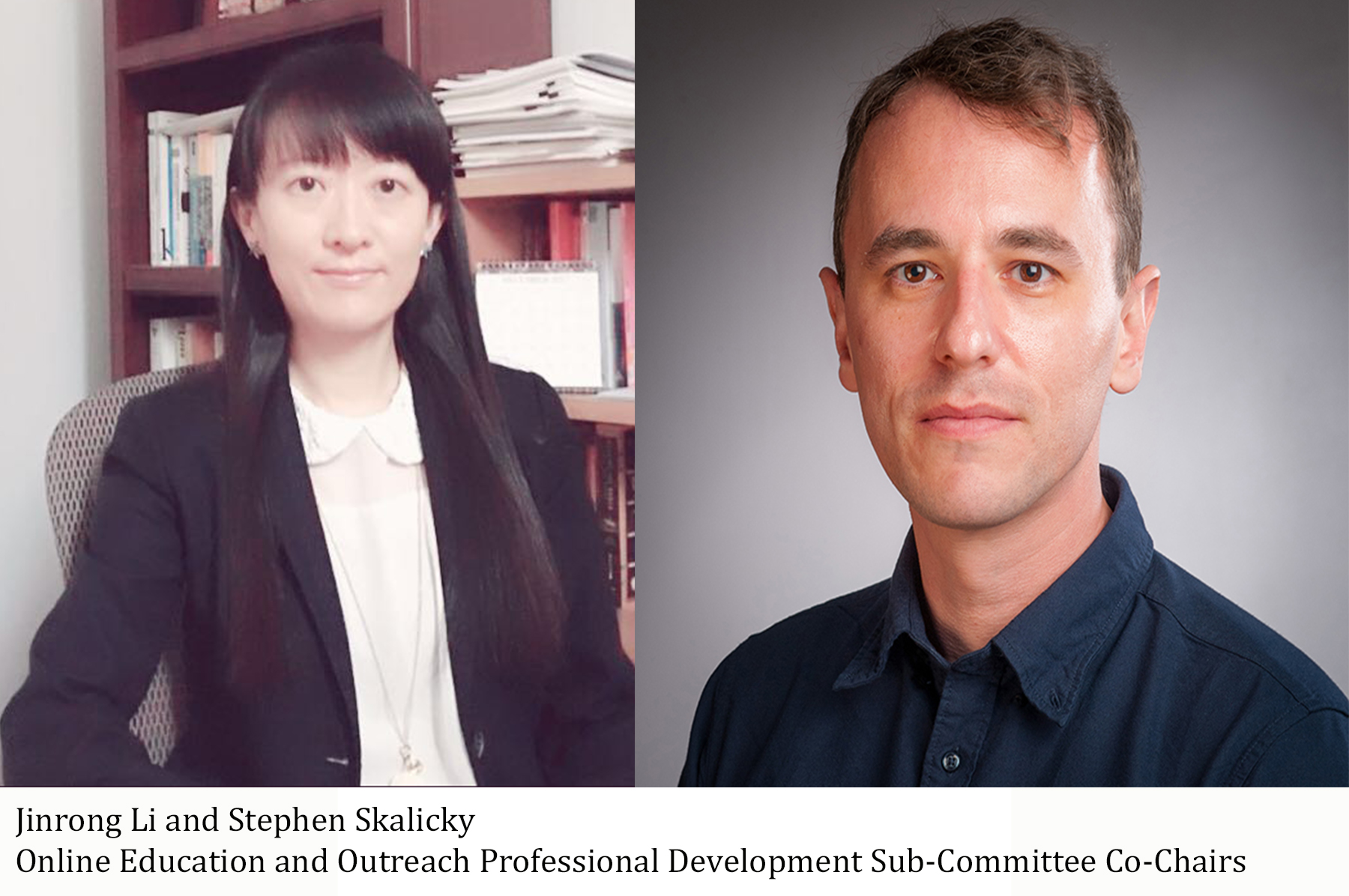 AAAL professional development
AAAL professional development
Sub-Committee Chairs: Jinrong Li (Georgia Southern University) and Stephen Skalicky (Victoria University of Wellington, New Zealand)
First of all, we are happy to report the formation of our sub-committee. Please welcome Gena Bennett (Educator and Consultant), Stephen Moody (Brigham Young University), Hyun-Sook Kang (University of Illinois at Urbana-Champaign), and An Nguyen Sakach (Ohio University). In addition to offering their time and service to AAAL, the new members of our sub-committee represent a broad range of backgrounds, academic positions, and research interests. Accordingly, we are confident that this variety of perspectives will allow the Professional Development Sub-Committee to address the various professional development needs of many AAAL members. We are already hard at work meeting and developing initiatives aimed at professional development. Our first goal is to complete a formal needs assessment of AAAL members (please keep your eyes out for a survey!). Future plans include more ambitious goals, such as creating a AAAL podcast and producing webinar workshops. We are always happy to hear ideas and feedback from AAAL members, so please do not hesitate to contact us with any questions or suggested topics.
AAAL social media
Sub-Committee Chair: Yu Jung Han (The University of Rochester)
The Social Media Sub-Committee focuses on increasing AAAL’s presence, visibility, and accessibility and facilitating AAAL’s community building by connecting members through different AAAL channels. Three creative minds have agreed to serve on the Social Media Sub-Committee: Sarah Carey (Teachers College, Columbia University), James Coda (University of Georgia), and Svetlana Koltovskaia (Oklahoma State University). Some of our initiatives for the first year include:
- Generating AAAL social media content,
- Updating the promotional strategies for AAAL events,
- Setting up the guidelines for moderation on AAAL social media, and
- Fostering a stronger connection with the AAAL Graduate Student Council (GSC) Social Media Sub-Committee.
AAALetter
Sub-Committee Chair: Steph Link (Oklahoma State University)
The AAALetter continues to be a primary source of information exchange between the Executive Committee and the AAAL membership. This year, we are excited for the opportunity to expand our reach by collaborating with the broader committee and forming a sub-committee to take the newsletter to new heights. The new sub-committee includes Sarah Hercula (Missouri University of Science and Technology) and Melike Ünal Gezer (TED University, Turkey). These individuals are major contributors to the success of each issue, and we want to welcome them to the AAALetter team!
We hope to make our Standing Committee as community-driven as possible, and we encourage all members to complete the surveys that we will be sending out to help us generate content and materials. Please follow our social media pages and stay tuned for updates on Twitter and Facebook . In addition, if you have any comments, ideas, or feedback for the committee or any of the sub-committees, please contact us at aaalonline@aaal.org.
Third Annual Conference Connections Goes Virtual
Message from the Conference Connections Committee Chair
Bethany Gray, Iowa State University
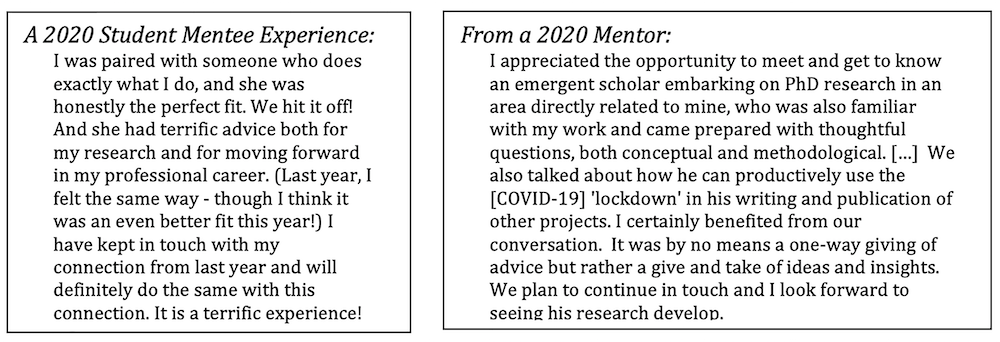
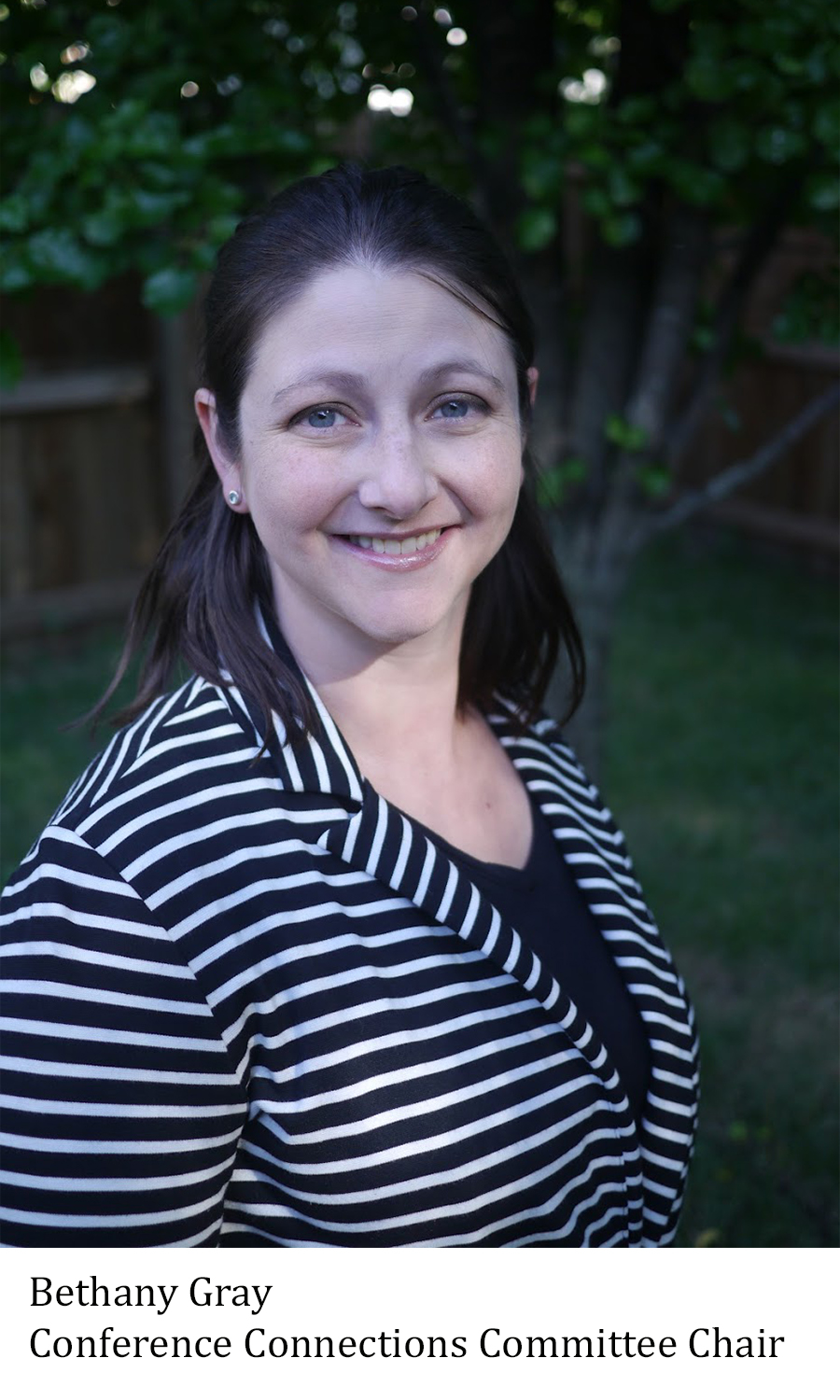 Conference Connections was established in 2018 to address the professional development needs of student members of AAAL. The premise is simple: pair interested student conference attendees with more senior members of AAAL who could serve in a mentoring role as students navigate the AAAL conference, develop professional relationships, and grow in the field of applied linguistics. The program is designed to provide students at all stages with structured opportunities for general mentoring support as well as research and advanced professional development:
Conference Connections was established in 2018 to address the professional development needs of student members of AAAL. The premise is simple: pair interested student conference attendees with more senior members of AAAL who could serve in a mentoring role as students navigate the AAAL conference, develop professional relationships, and grow in the field of applied linguistics. The program is designed to provide students at all stages with structured opportunities for general mentoring support as well as research and advanced professional development:
- General mentoring support: This option is ideal for students who are in earlier stages of their scholarly development; they can generally articulate their areas of interest but may not have a defined research trajectory yet. Some topics for discussion could include writing a successful conference or research proposal, becoming involved in service as a graduate student, dealing with the “publish or perish” culture in academia, managing work/life balance, and/or navigating AAAL and the field of applied linguistics in general.
- Research and advanced professional development: This option is ideal for graduate students/candidates who are in the later stages of their scholarly development; they have a clearly defined research trajectory and can articulate what topics they would like to explore with their mentors. Some topics for discussion could include turning a presentation into a journal article, developing a dissertation chapter, applying for jobs/entering the academic job market, securing funding for research and external projects, or becoming an independent and primary researcher.
Now in its third year, the AAAL Conference Connections Program continues to grow: for the AAAL 2020 conference, more than 100 student conference attendees were paired with faculty mentors. Even the cancellation of the 2020 conference due to the COVID-19 pandemic could not keep our engaged students and dedicated senior members from establishing the mentor-mentee relationship! Many mentor/mentee pairs shifted to virtual meetings, meeting via Zoom or Skype and sending e-mails to introduce themselves and to engage in conversation. We are incredibly appreciative of our engaged student mentees and our dedicated mentors who continued the important work of Conference Connections!
As I transition into the role of Chair of the Conference Connections Committee, I look forward to a new year of mentoring at AAAL 2021 in Houston. I invite all of our AAAL membership to consider participating in Conference Connections 2021 when we next convene in Houston.
I would like to take a moment to thank Peter De Costa (Chair) and my colleagues on the 2020 Conference Connections Committee: Dustin Crowther, Francis Hult, Matt Kessler, Jiyoon Lee, Matt Poehner, Christina Ponzio, Andrea Révész, and Bedrettin Yazan. Their coordination has helped to establish the Conference Connections Program as a regular component of AAAL annual meetings.
And finally, on behalf of the whole committee, we would like to recognize our 2020 mentors.
Thank You to our Conference Connections 2020 Mentors:
| Suriati Abas | Frieda Amitai | Netta Avineri | Katie Berstein |
| Usree Bhattacharya | Suresh Canagarajah | Lucia Cardenas Curiel | Christine Casanave |
| David Cassels Johnson | Christian Chun | Laura Collins | Fiona Copland |
| Viviana Cortes | Bill Crawford | Scott Crossley | Dustin Crowther |
| Xiao Lan Curdt-Christiansen | Peter De Costa | Sender Dovchin | Patsy Duff |
| Andy Gao | Kimberly Geeslin | Daniel Ginsberg | Aline Godfroid |
| Bethany Gray | Anne Marie Gurrettaz | Mari Haneda | Linda Harklau |
| Ruth Harman | John Helerman | Katheryn Henderson | Sarah Hercula |
| Christina Higgins | Nancy Hornberger | Francis Hult | Valerie Jaker |
| Scott Jarvis | Eun Hee Jeon | Hyun-Sook Kang | Sara Kangas |
| Hayriye Kayi-Aydar | Amanda Kibler | Youjin Kim | Kendall King |
| Ryuko Kubota | Jiyoon Lee | Jennifer Leeman | Constant Leung |
| Glenn Levine | Shawn Loewen | Stephen Looney | Jason Martel |
| Melinda Martin-Beltran | Paul Kei Matsuda | Hiram Maxim | Stephen May |
| Janice McGregor | Mary McGroarty | Jim McKinley | Paul McPherron |
| Sarah Mercer | Marije Michel | Elizabeth Miller | Ryan Miller |
| Sheilah Nicholas | Deniz Ortactepe | Ghada Othman | Deborah Palmer |
| Luke Plonsky | Matthew Poehner | Charlene Polio | Luis Poza |
| Matt Prior | Andrea Revesz | Ute Romer | Jonathan Rosa |
| Heath Rose | Vanessa Santiago Schwarz | Masatoshi Sato | Peter Sayer |
| Caroline Seibert Hanson | Luis A.G. Senna | Jaran Shin | Rachel Showstack |
| Shelley Staples | Scott Sterling | Neomy Storch | Peijan Sun |
| Robert Taferner | Naoko Taguchi | Christine Tardy | Steven Thorne |
| Paul Toth | Francis Troyan | Nelleke Van Deusen-School | Koen Van Gorp |
| Margaret van Naerssen | Doris Warriner | Li Wei | Jill Wigglesworth |
| Heather Willis Allen | Paula Winke | Lyn Wright | Wayne Wright |
| Xun Yan | Bedrettin Yazan | Youngjoo Yi | Dongbo Zhang |
| Xian Zhang |
Robert B. Kaplan, a Remembrance
Bill Grabe, Northern Arizona University
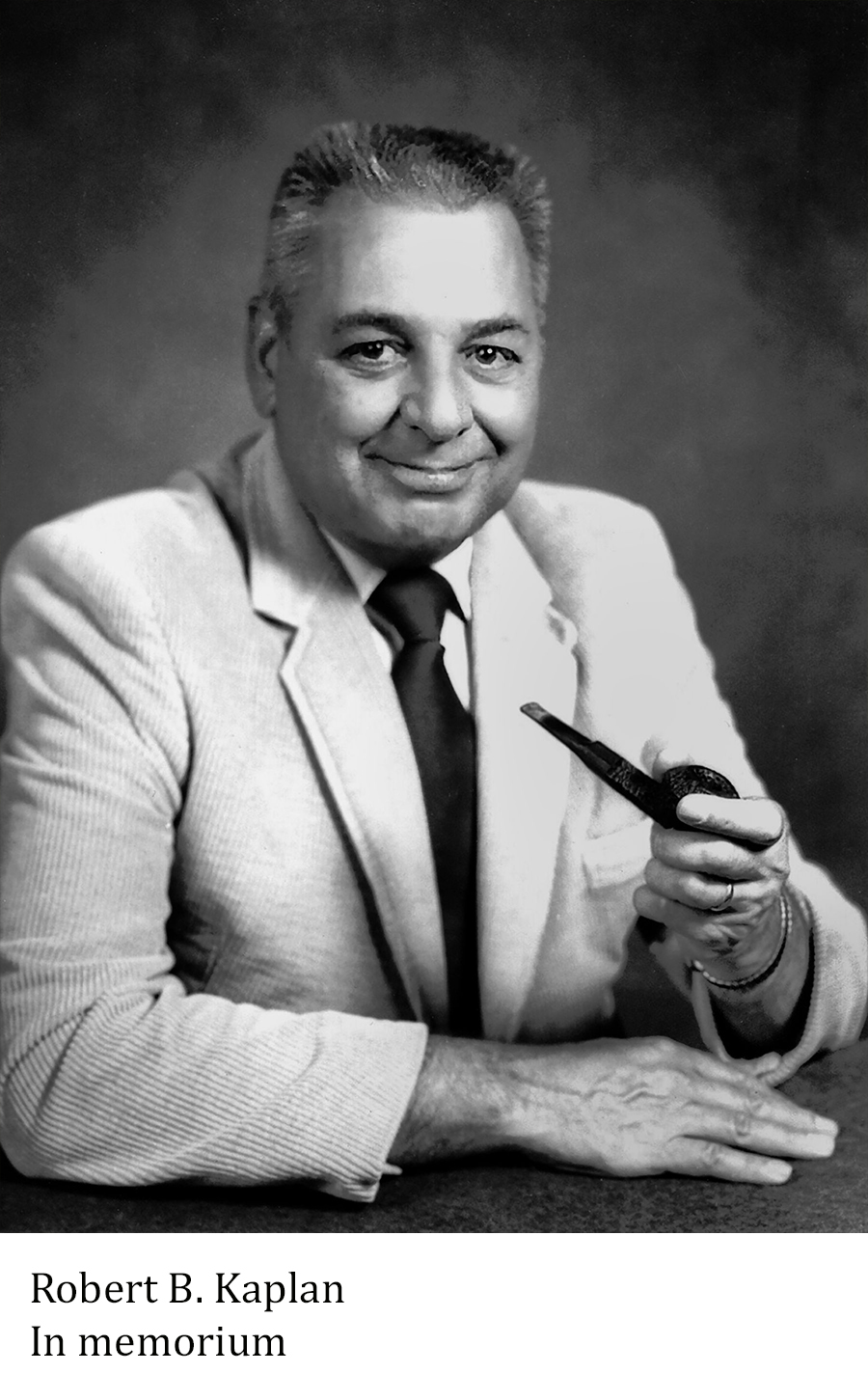 Bob Kaplan began his academic career as a faculty member at the University of Southern California (USC) in 1963, first in the English Department and then in the Department of Linguistics, retiring from USC in 1996. In his earlier years, he was one of the pioneers in the emerging field of applied linguistics as well as in the academic fields of discourse analysis and language policy and planning. In 1966, he published an article in Language Learning that made him famous (and infamous) in applied linguistics and in the related fields of English language studies, teaching English as a second language, and discourse studies—“Cultural Thought Patterns in Inter-Cultural Education,” otherwise known as the “doodles article.” His article has withstood the test of time and is still recognized for its essential thesis: preferred patterns of discourse in writing are shaped by cultural, linguistic, and educational forces that can create significant challenges for second language learners in more advanced writing contexts. This area of Kaplan’s research is now generally recognized as the field of intercultural rhetoric.
Bob Kaplan began his academic career as a faculty member at the University of Southern California (USC) in 1963, first in the English Department and then in the Department of Linguistics, retiring from USC in 1996. In his earlier years, he was one of the pioneers in the emerging field of applied linguistics as well as in the academic fields of discourse analysis and language policy and planning. In 1966, he published an article in Language Learning that made him famous (and infamous) in applied linguistics and in the related fields of English language studies, teaching English as a second language, and discourse studies—“Cultural Thought Patterns in Inter-Cultural Education,” otherwise known as the “doodles article.” His article has withstood the test of time and is still recognized for its essential thesis: preferred patterns of discourse in writing are shaped by cultural, linguistic, and educational forces that can create significant challenges for second language learners in more advanced writing contexts. This area of Kaplan’s research is now generally recognized as the field of intercultural rhetoric.
Kaplan’s work in discourse analysis included an analytic framework for written discourse in the early 1970s that drew on the work of Francis Christiansen, then a colleague in the English department at USC. Kaplan’s approach to discourse studies also influenced, and was influenced by, research in the applied field of English for specific purposes (ESP) for decades. His wider interests in writing were long-standing, going back to early critical commentary on T. S. Elliot’s The Wasteland and Salinger’s The Catcher in the Rye in the 1960s, to texts on writing instruction and research syntheses on text analysis in the 1980s, to wide-ranging research syntheses on writing abilities in the 1990s and 2000s (Theory and Practice of Writing in 1996 and “A History of Discourse Analysis” in 2002, both with Bill Grabe).
Kaplan also was a long-standing, highly-productive leader in the field of language policy and planning (LPP). In the 1970s, he was involved in international language policy and planning projects examining the role of English in Taiwan and later consulted on the language needs of migrant workers in New Zealand. In the 1980s and 1990s, he continued to write on LPP and co-founded the journal Current Issues in Language Planning (with Richard Baldauf), a journal still in production (Taylor and Francis). With his colleague Richard Baldauf, he also co-authored two major books on the theory and practice of LPP in the 1990s. He also began and served as the general editor for a major book series on LPP that describes the language situations in many countries around the world, producing 26 edited volumes from 1999 to 2012.
Kaplan was also an early leader in the field of applied linguistics more generally. He played a role in the early years of the professional organizations Teachers of English to Speakers of Other Languages (TESOL) and the American Association for Applied Linguistics (AAAL) in the latter part of the 1970s. In 1980, he both published an important volume on applied linguistics, On the Scope of Applied Linguistics, and founded the Annual Review of Applied Linguistics (ARAL), a journal that is now in its 40th year (Cambridge University Press). In more recent years, he edited a highly cited volume on the field of applied linguistics, The Oxford Handbook of Applied Linguistics (first edition in 2002, second edition in 2010). He also co-edited the applied linguistics entries for both editions of the Oxford International Encyclopedia of Linguistics (first edition in 1992, second edition in 2003). Recalling back to the 1970s, Dick Tucker comments, “I had the good fortune of working with Bob during the founding days of AAAL and the early years of the Annual Review of Applied Linguistics, given my role as President of the Center for Applied Linguistics. It was a distinct privilege and pleasure to have worked with such a talented and gracious human being.”
Kaplan not only wrote about the academic fields that engaged his attention, he also contributed significantly to each of the major organizations that he was centrally involved in. Among other contributions of his time and energy, he was President of three national/international academic organizations: National Association of Foreign Student Affairs (NAFSA), 1983–1984; TESOL, 1989–1990; and AAAL, 1993–1994.
In addition to his multiple contributions across several academic fields, he was well-recognized for his attention and devotion toward his many graduate students during his long career at USC. Among those who were Bob’s students back in the 1970s, Bill Eggington commented, “for those fortunate few who were extensively mentored by Kaplan, the prevailing descriptor of his relationship to us was ‘genuineness.’ Kaplan was a genuine friend and scholar.” And Ann Johns added, “Bob provided constant support and encouragement, wrote superb letters of recommendation, and freely shared his remarkable knowledge of applied linguistics.”
At both the MA and PhD levels, he tirelessly gave his energy to his students. He was quite famous for his extensive written comments on student papers, usually on the reverse side (“see back” or “see over”). For students who stayed in the field of applied linguistics and related academic fields, he was a great mentor, freely giving of his time even 20 to 40 years after their graduation from USC. Many of his students became faculty members in universities around the world, and in many cases, became subsequent leaders in different academic professional organizations. Somewhat less well-known to his academic colleagues, he was also a champion of minority rights, especially for minorities in academic and administrative positions.
Tribute to Sarah J. Berke, Nardone Consulting Group
Laura Collins, Concordia University and Heidi Byrnes, Georgetown University
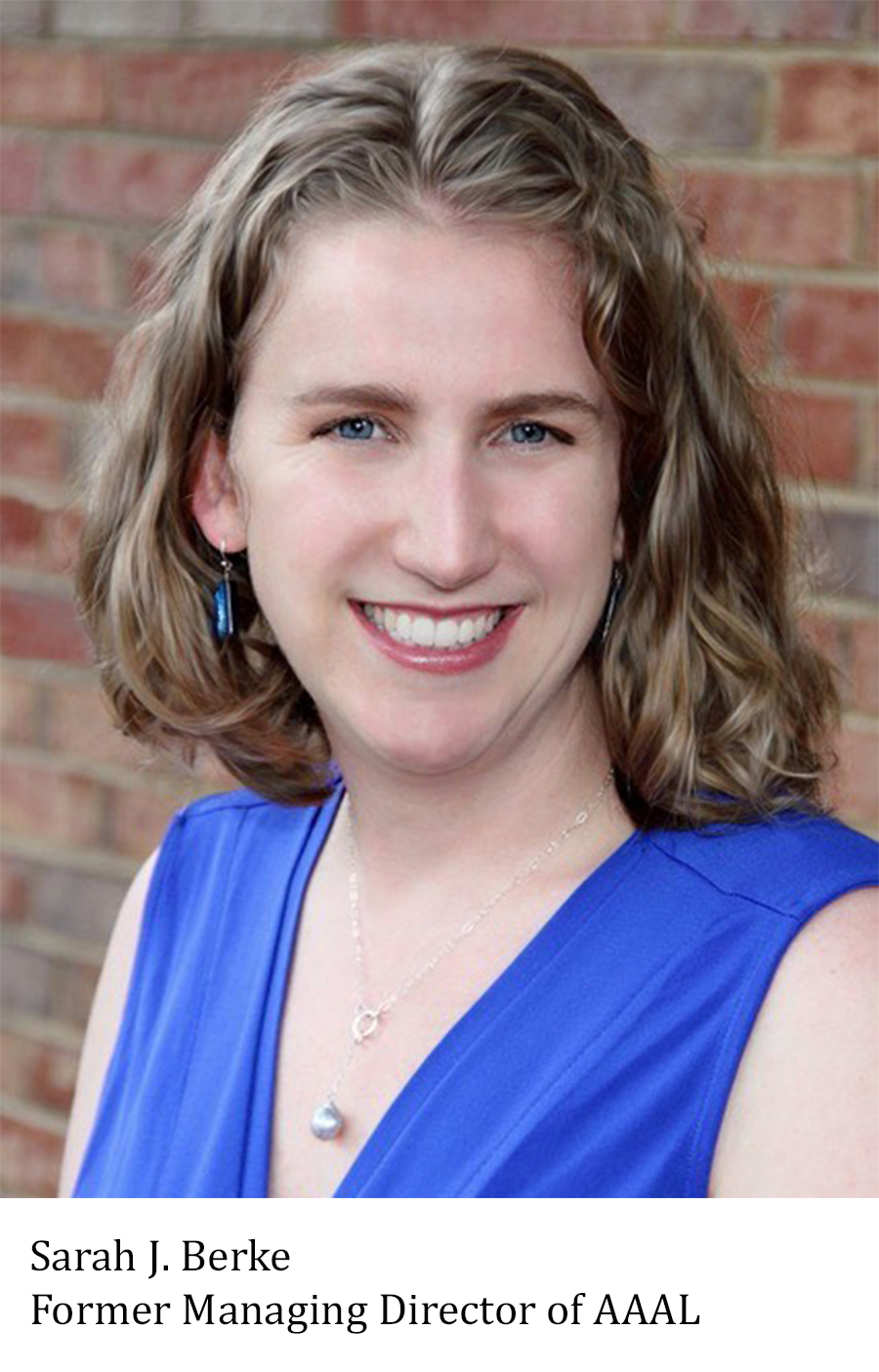 Sarah J. Berke, Managing Director of the team within the Nardone Consulting Group that oversees the organizational management of AAAL, began working with us in 2010. As the mother of a young daughter with another child on the way, Sarah wanted to spend more time with her family and consequently made the decision to leave Nardone on April 30, 2020.
Sarah J. Berke, Managing Director of the team within the Nardone Consulting Group that oversees the organizational management of AAAL, began working with us in 2010. As the mother of a young daughter with another child on the way, Sarah wanted to spend more time with her family and consequently made the decision to leave Nardone on April 30, 2020.
Sarah’s dedicated service to AAAL has been invaluable. I have had the pleasure of working with her on the Executive Committee (EC) twice: once as Member at Large and, more recently, in the four-year cycle that includes terms as Conference Chair and President. I was not on the EC when Sarah began her involvement with AAAL, however. So, to fill in the historical gaps, I contacted Heidi Byrnes, who was President of AAAL in 2010 and who has remained an active member of our association. Her detailed and enlightening response paid such homage to Sarah’s involvement in AAAL, so I invited her to share it with the membership. To my delight, she agreed:
As I reflected upon Sarah’s contributions to our association, I realized that it may not be immediately apparent just how much AAAL has evolved since 2010. At the time, the idea of switching to the use of a professional management company was a dramatic change in how the organization was run. There was a real concern that the benefits and services that Nardone offered to us in its proposal would take AAAL in a “corporate” direction, spelling the end of our much-prized identity as a volunteer organization run by faculty. After much deliberation, we decided to take the leap. While there were certainly bumps in the road toward more “organization-like” behavior on our part, how we learned to interpret them and turn them around so we could benefit from them in our imagined future was almost entirely Sarah’s doing. It was the combination of her professional knowledge and her personal qualities that, with patience and grace, ultimately delivered the necessary persuasive force that won everyone over and gradually changed the nature of our discourse about AAAL.
What did Sarah gently lead us to understand (within the larger parameters of professional management of a volunteer organization like ours that was massively dependent on the make-or-break situation, fiscally and otherwise, of an annual conference)? Here are some of the directions she nudged us towards:
- First and foremost, it was the notion of planning, combined with something that we still had to learn: namely, that planning does not mean Diktat and inflexibility if things change. This includes linking organizational behavior to fiscal realities and adapting/changing one or the other as needed.
- Also important was enhancing membership growth through targeted efforts, looking to new constituencies that were underserved. Inclusiveness needed to be a guiding principle, and she helped us see its various possible manifestations.
- Central to anything we wanted to accomplish was knowing much more decisively who we were, in other words, what the “mission” of the organization was. That would include various ways of projecting to the outside world.
Sarah deftly linked all of the above to the capabilities and resources that were available within various sectors of Nardone and, furthermore, tied them to our need to explore a range of technological tools that were becoming available. She also encouraged a much more structured and accountable approach than we had used in the past.
Most importantly, she was able to do all this because she left no doubt about her commitment to us as an organization and to understanding and promoting what we were all about—even though she reminded us that we needed to articulate that more succinctly. Sarah attended and actively participated in the EC meetings and saw to it that the “before, during, and after” of decisions and initiatives would fit together. As she said to me on more than one occasion: she liked us and valued our work and was committed to enabling us to succeed. She would be our advocate; she would be our institutional memory; she would be the visionary of things we did not even know existed as possibilities for making us better, our gentle but also insistent prodder, our on-the-ground implementer (and quality control checker) of myriad interrelated details (from updating standing rules through to conference management), our advocate for being more than we were, and our enthusiastic cheerleader for our diverse accomplishments. During the years that AAAL has had the privilege of working with Sarah, the organization has been the fortunate beneficiary of all of those qualities. We owe her a tremendous debt of gratitude.
In her final week with Nardone, Sarah and her team were able to negotiate a settlement with the Denver Sheraton Hotel that decreased AAAL’s financial liability and resulted in a better outcome than we had originally feared. She also participated in the hiring and training of her successor, Terry Dougherty, to facilitate as smooth a transition as possible for all of us. And she did all of this while expecting to go into labor with Caylee at any moment…who joined the Berke family on May 7!
In recognition of her immense contribution to AAAL and our deep appreciation for her professional and personal qualities, AAAL has extended to Sarah J. Berke an honorary lifetime membership to the Association.
Professional Tip: Managing Communication During a Crisis
Message from the AAAL Secretary and AAAL-AILA Representative
Fabiola P. Ehlers-Zavala, INTO Colorado State University
This segment is intended to offer a brief professional tip that you may find useful to consider or share with others as you see fit.
Applied linguists play many roles in the organizations/institutions in which we participate. Sometimes we are in active leadership/administrative roles; other times, we are educators/researchers dedicated to serving our various communities at multiple levels (locally or internationally). In many cases, we do all of the above simultaneously! Irrespective of our roles, one common denominator we have likely faced is the question of how to manage the communication flow in times of crisis. Some of the questions we have entertained include: How can we communicate effectively? What can be shared? To what extent does what we share contribute to the well-being of our teams and/or colleagues? And what can be asked and of whom? As I have navigated within my own contexts as a leader/administrator, in considering these questions, here is what I have found useful:
- Be sure to frequently convey sentiments of both solidarity and appreciation for what everyone contributes.
- Communicate the facts you know to ensure trust is built. Reach out to update those around you even when there is no new information.
- Remind everyone of the need to remain flexible and ready to adapt as we deal with the unknown, acknowledging that these goals can certainly be very challenging.
- Reassure colleagues, students, and staff that we are actively engaging in planning a path to move forward.
- Solicit and listen to input from others with the clearly expressed caveat that it will be considered to the extent possible. Seeking and finding ways to solicit and consider input and feedback can go a long way with those around us and allows us to demonstrate that we are truly fostering inclusive approaches in moving our work forward.
Finally, as I am sure you will agree, there is nothing easy when it comes to navigating the unknown or when new information keeps rapidly changing. Crises of the sort we are experiencing at present give us an opportunity to put everyone’s creativity at work to innovate. In other words, collaborative approaches to problem-solving—while they may take longer—can help us ensure there is also buy-in from various stakeholders. After all, we are in it together!
How to Participate in the AAAL Resolutions Process
Message from the AAAL Office
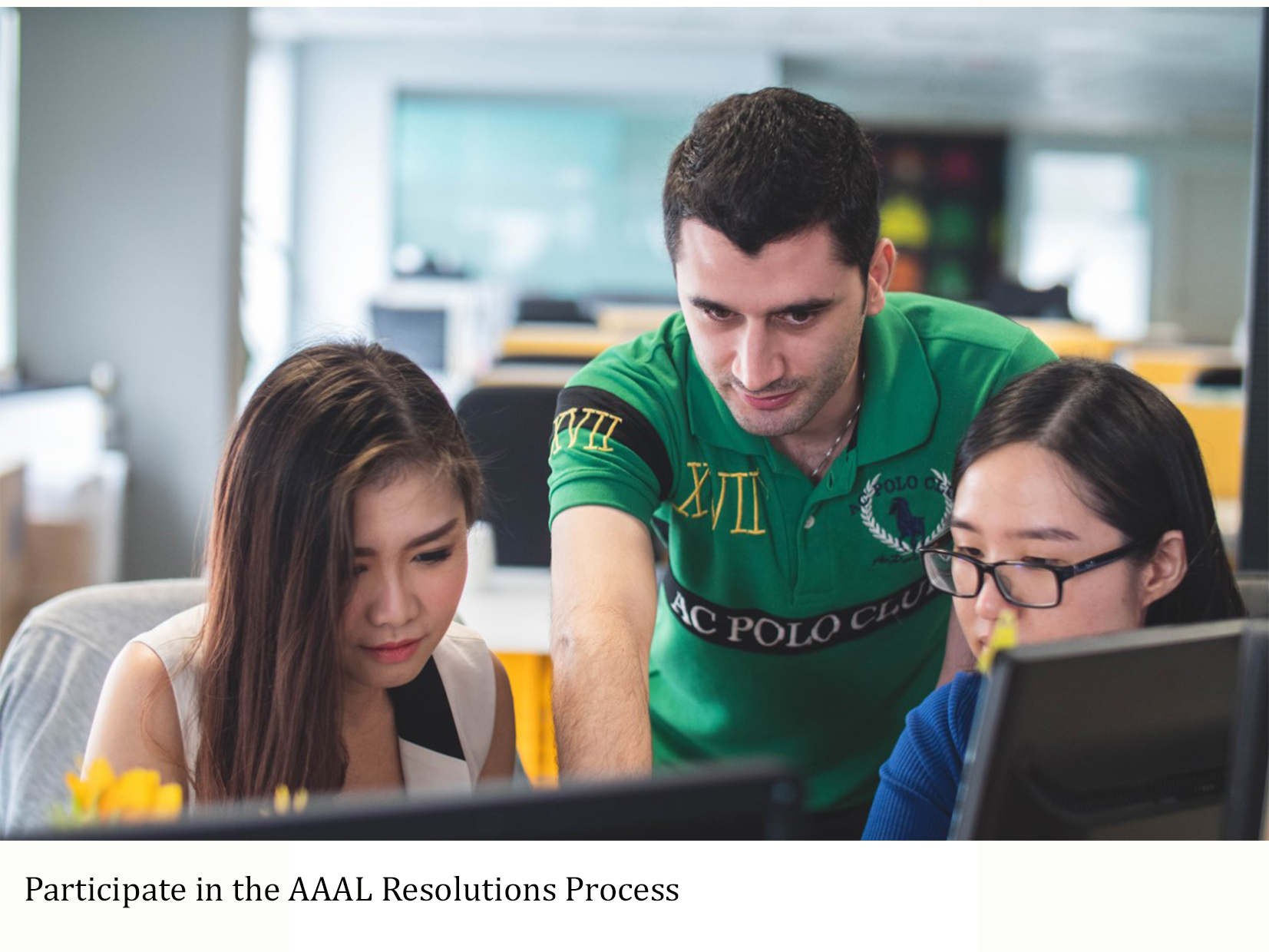 The resolution process is an important means through which AAAL members can make their voices heard on issues integral to AAAL’s governance and operations. The Resolutions Committee is charged with the responsibility of processing all resolutions proposed by the membership before they are acted upon at the general business meeting of AAAL, including those calling for an amendment to the bylaws as outlined in Article XII: Amendments. The Resolutions Committee may also originate courtesy resolutions.
The resolution process is an important means through which AAAL members can make their voices heard on issues integral to AAAL’s governance and operations. The Resolutions Committee is charged with the responsibility of processing all resolutions proposed by the membership before they are acted upon at the general business meeting of AAAL, including those calling for an amendment to the bylaws as outlined in Article XII: Amendments. The Resolutions Committee may also originate courtesy resolutions.
View the AAAL Resolutions Procedures here.
